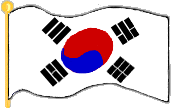가위 바위 보
Kai (scissors), Bai (rock), Bo (paper) is a choosing game used to decide something between two kids. It's the Korean version of "Rock, Paper, Scissors", but in a different order (i.e. scissors, rock, paper).
가위 바위 보
Scissors, Paper, Rock
Counting-out Rhyme
Counting-out Rhyme
(Korean)
(English)
가위
바위
보
Scissors
Paper
Rock
Notes
Pronunciation:
Kai (scissors)
Bai (rock)
Bo (paper)
It's sometimes pronounced "gawi, bawi, bo".
Game Instructions
Two players each hide one hand behind their backs. Then, at the same time the two players say: "Kai, bai, bo!". Then they each put a hand out at exactly the same time in one of three signs: Kai (scissors), Bai (rock), Bo (paper). To choose "scissors", you put out the thumb and pointer finger imitating scissors. You make a fist for "rock". You put out a flat hand horizontal to the ground for "paper".
Here's how you know who won the round depending upon which symbol each kid put out:
- Rock (bai) beats Scissors (kai)
- Scissors (kai) beats Paper (bo)
- Paper (bo) beats Rock (bai)
If both kids put out their hand as the same object, they have to replay the round. Whoever wins 2 out of 3 rounds wins.
Comments
According to Wikipedia, "Muk-jji-ppa [muk = rock, jji = scissors, ppa= paper] is a variant of the two-player game rock paper scissors. It originated in South Korea. The basic idea of Muk-Jji-Ppa is known to be originated from Japan after the victory of the Russo-Japanese war.
Each person starts with a regular rock paper scissors game. The current winner has to say their next hand and change their hand to the corresponding one. This is usually done by shouting. The point is to get your opponent to make the same hand as you and then you win. However, if your hands don't match, the new winner then calls out their next hand and the process starts over. Both parties then call out the next two possible once someone wins."

Thanks!

























